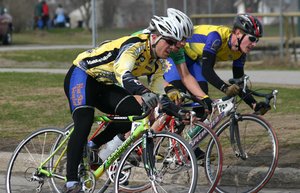Road bicycle racing
|
|
| This article is part of the Bicycle racing series |
| Gear |
| Racing bicycle |
| Mountain bicycle |
| Track bicycle |
| Cyclo-cross bicycle |
| BMX |
| Types |
| Road bicycle racing |
| Mountain biking |
| Track cycling |
| Cyclo-cross racing |
| BMX racing |
| See also... |
| Compare to... |
| Utility cyclingRecreational cycling |
Road bicycle racing is a popular bicycle racing sport held on the road (following the geography of the area), using racing bicycles.
It is popular all over the world, but especially in Europe. The most competitive and devoted countries are generally thought to be Belgium, France, Germany, Italy, the Netherlands, Spain and Switzerland, although the United States also have a high international standing, and many countries in the world have great professional cyclists.
Road races can be categorized by length and type:
| Contents |
Length
- Single-day races: The competitor to cross the finish line first is declared the winner.
- Multi-stage races: Consists of several 'stages' ridden consecutively.
The competitor with the lowest cumulative time to complete all the stages is declared the overall, or General Classification (GC), winner. Most stage races also have other categories of winners such as the stage winner, the points winner, and the "King of the Mountains" winner.
A stage race can also be a series of road races and time trials. The stage winner is the first person to cross the finish line that day or the time trial rider with the lowest time on the course.
Race/Stage Types
- Open road race: Generally going from point A to point B; can include multi-laps.
- Criterium: Generally a circuit race with multiple laps around a short, usually 4-cornered course; often includes primes (points or prizes for intermediate laps).
- Individual time trial: Every rider starts apart, and the rider with the fastest time wins.
- Team time trials: Riders start in groups or teams, usually of a fixed size. The time of the nth rider of a team counts for the classification.
- Stage (bicycle race): one part of a multi-day race, such as the Tour de France.
Racing terminology
Types of riders
- An all-rounder combines the powers of all types of riders, typically with an emphasis on climbing and time trialling. In stage races, an allrounder seeks a top-10 place in the General Classification. Eddy Merckx was a notable all-rounder; Lance Armstrong, Jan Ullrich and Ivan Basso are all modern examples of all-rounders.
- A climbing specialist rides exceptionally fast on highly inclined roads.
- A domestique is an individual riding in a support role for a team leader.
- A sprinter has great finishing speed, but is not usually built for climbing.
- A time trialist is a rider that can maintain a constant high tempo in a race against the clock.
A cycling team should be a good mix of these five specialisations.
Other concepts
- An attack is an attempt by one or more riders to quickly pull ahead.
- Blocking is used by riders of one team who sit at the front of a group to control the speed, often to the advantage of one of their teammates.
- A break or breakaway is a small group of riders that have pulled away from the peloton.
- Drafting is used in small groups that ride in each other's slipstream to reduce wind resistance.
- A rider who has been dropped has been left behind a breakaway or the peloton for whatever reason.
- An echelon is a staggered form of paceline used to get maximum draft in a crosswind.
- A leadout is a sprinting technique often performed by the leadout man where the rider will accelerate to maximum speed close to the sprint point with a teammate, the sprinter, drafting them from behind. When the leadout man is exhausted he will move to the side to allow his teammate to race in the sprint.
- A paceline is formed with the riders all drafting one another. Riders will take turns at the front to break the wind, then rotate to the back of the line to rest in the draft. Larger group rides will often form double pacelines with two columns of riders.
- The peloton (from French, literally meaning ball and related to the English word platoon) or bunch is the large main group in a cycling road race.
- A sag wagon is a support vechicle following long races to pick up riders unable to complete the race.
Famous bicycle races

The Grand Tours
The most famous cycling race is the Tour de France, a multi-stage tour over three weeks through France, traditionally ending in Paris. Similar long multi-stage tours are held in Italy (the Giro d'Italia) and Spain (the [[Vuelta a Espa). These three races make up the "Grand Tours".
UCI ProTour events
Professional racing is governed by the Union Cycliste Internationale. In 2005 it instituted the UCI ProTour to replace the UCI World Cup series. While the World Cup contained only one-day races, the ProTour includes the Grand Tours and smaller stage races such as Paris-Nice and the Crit鲩um de Dauphin頌ib鲩.
The most important one-day races, including all five Classic cycle races or 'Monuments', are also part of the ProTour: Milan-San Remo (Italy), Tour of Flanders (Belgium), Paris-Roubaix (France), Li觥-Bastogne-Li觥 (Belgium) and Amstel Gold Race (Netherlands) in spring, Clasica San Sebastian (Spain), HEW-Cyclassics Cup (Germany), Championship of Zürich (Switzerland), Paris-Tours (France) and Tour of Lombardy (Italy) in autumn.
Other notable races
The Race Across America, or RAAM is an ultra marathon road race. It is a single stage race without designated rest periods about 3,000 miles or 4,830 kilometers long over 9 days with cyclists racing approximately 22 hours a day.
For a more extensive list see: List of important cycling events

